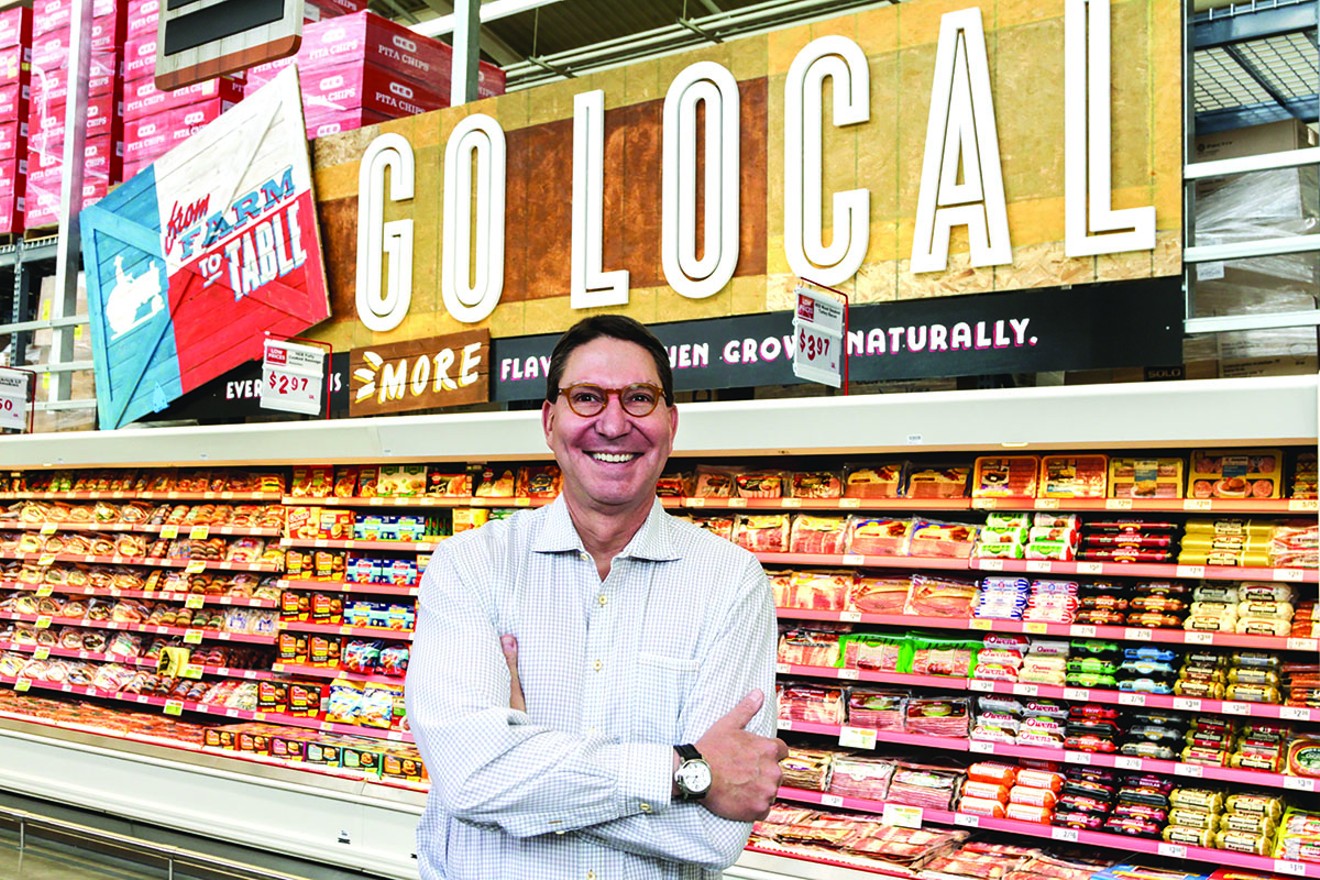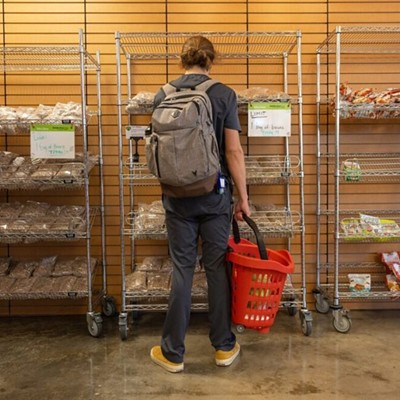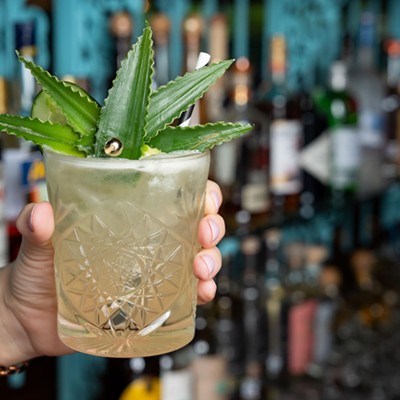Scott McClelland saw it in the faces of evacuees when he was visiting the George R. Brown Convention Center in the days following Hurricane Harvey. He saw it in the faces of people who’d lost everything, in the weeks after in Rockport, where the mosquitos had grown as big as birds, and yet residents remained resilient. He saw it in his own employees, including one who made it on the nightly news, wading through three feet of water with his H-E-B uniform held above his head just to get to work on time. He saw hope, unity and, as he calls it, “The spirit of Texas.”
McClelland is the president of Texas grocery store chain H-E-B, which remains an anomaly in terms of its ability to efficiently and effortlessly operate and also bring relief to victims during a natural disaster. On top of helping to raise more than $3 million in donations for Harvey Relief, the grocery store’s emergency preparedness team helped feed thousands of evacuees and first responders during and directly after Hurricane Harvey, while also operating stores in various devastated cities across Texas to help their communities get much-need supplies and food.
“We run two different disaster-preparedness groups, one within our stores and one within our communities,” McClelland explains. While hundreds of H-E-B employees, or “partners” as they’re called, were volunteering to be moved to help out at stressed sister locations from Corpus Christi to Beaumont, a small crew was also operating a mobile kitchen that can feed upwards of 2,000 people a day, along with a fully functioning mobile pharmacy on wheels and a mobile ATM.
The mobile kitchen came about thanks to a longtime H-E-B employee, Eddie Garcia, who was in the military, pre-Vietnam, working as a cook on a flatbed mobile kitchen. “Back then, what he did was really dangerous, open flames and tanks of gas, that sort of thing,” McClelland says, “but it was amazing that they could feed hundreds at a time. When he saw us needing to get food and water to communities during previous disasters, he remembered this truck they’d worked on and he began to design a mobile kitchen.”
Today the H-E-B mobile kitchen, called the H-E-B Eddie Garcia Mobile Kitchen, is manned by just six people. Three are over the age of 70. Only one is under 50. “I always joke around and ask if they call that one guy ‘the kid’?” Between the truck, a tractor trailer and a veritable gangplank that runs between the two, the crew provides nutritious meals wherever and whenever needed, as it did during the Magnolia fires earlier this summer, and when the fertilizer plant blew up in West, Texas, last year. During that crisis, H-E-B was able to arrive quicker than the Red Cross. During Harvey, the mobile kitchen was able to serve hot meals to 40,000 people in need, moving from Rockport to Victoria to Houston to Beaumont within a span of a few days’ time. On top of feeding people, the truck is also a morale booster.
“During these times,” McClelland says, “people get so tired of eating sandwiches.”
McClelland says the biggest challenge during Harvey was delivering water to Beaumont, as basically every road into the city was blocked because of flooding. “It took 16 hours to get water there, but we found a way. That was the only way they got water.”
Every time there’s a natural distaster, his team learns things they can do better. “That’s our job. We live for this stuff. We want the community to know they can count on us.”
Whether that’s through H-E-B employees volunteering to work in stores far away from home, or his own wife bagging groceries, or the CEO of the company, Charles Butt, donating $5 million of his own money to Harvey Relief, McClelland says he is proud and often amazed at the attitude all H-E-B partners seem to have. “Even for those making $12 an hour, this is the way for them to make a difference. They realize they’re on the front line. They want the community to get fresh food.”
In the weeks since Harvey, H-E-B’s disaster relief effort has turned more toward offering Texas students school supplies, handing out gift cards in devastated areas such as Meyerland, shipping water to Florida for Irma relief, and trying to help suppliers and H-E-B stores get back on their feet. More than 144 of the chain’s stores were affected by the storm, whether through loss of sales, damage or just a plethora of employees facing devastation or displacement as well.
And as customers get back to their normal buying habits, McClelland says one good thing Harvey did, besides bringing the people of Texas together and showing the world how to unify and remain resilient during a time of crisis, was to help H-E-B take inventory. “I was walking down an aisle during Harvey and there was just cans and cans of tuna in curry. That’s all that was left. I said, ‘Why do we even stock this tuna in curry?’”
Apparently, you learn pretty quickly what people don’t want to eat even when they’re starving.
This article is part of our annual Best of Houston issue. Check out all the winners here.
Support Us
Houston's independent source of
local news and culture
account
- Welcome,
Insider - Login
- My Account
- My Newsletters
- Contribute
- Contact Us
- Sign out

Scott McClelland, president of H-E-B
Photo courtesy of H-E-B
[
{
"name": "Related Stories / Support Us Combo",
"component": "11591218",
"insertPoint": "4",
"requiredCountToDisplay": "4"
},{
"name": "Air - Billboard - Inline Content",
"component": "11591214",
"insertPoint": "2/3",
"requiredCountToDisplay": "7"
},{
"name": "R1 - Beta - Mobile Only",
"component": "12287027",
"insertPoint": "8",
"requiredCountToDisplay": "8"
},{
"name": "Air - MediumRectangle - Inline Content - Mobile Display Size 2",
"component": "11591215",
"insertPoint": "12",
"requiredCountToDisplay": "12"
},{
"name": "Air - MediumRectangle - Inline Content - Mobile Display Size 2",
"component": "11591215",
"insertPoint": "4th",
"startingPoint": "16",
"requiredCountToDisplay": "12"
}
,{
"name": "RevContent - In Article",
"component": "12527128",
"insertPoint": "3/5",
"requiredCountToDisplay": "5"
}
]
KEEP THE HOUSTON PRESS FREE...
Since we started the Houston Press, it has been defined as the free, independent voice of Houston, and we'd like to keep it that way. With local media under siege, it's more important than ever for us to rally support behind funding our local journalism. You can help by participating in our "I Support" program, allowing us to keep offering readers access to our incisive coverage of local news, food and culture with no paywalls.
Trending Food & Drink
- Upcoming Houston Food Events: JŪN Hosts a Pastry Pop-Up and Wine & Dine
- Openings and Closings: Molihua Taking Reservations, Holey Moley Debuts Today
- Feeding Houston: Brighter Bites, Houston Food Bank and Cougar Cupboard
-
Sponsored Content From: [%sponsoredBy%]
[%title%]

Don't Miss Out
SIGN UP for the latest
food & drink
news, free stuff and more!
Become a member to support the independent voice of Houston
and help keep the future of the Houston Press FREE
Use of this website constitutes acceptance of our
terms of use,
our cookies policy, and our
privacy policy
The Houston Press may earn a portion of sales from products & services purchased through links on our site from our
affiliate partners.
©2024
Houston Press, LP. All rights reserved.





